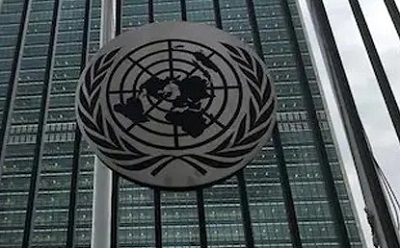United Nations, (Asian independent) An isolated US has shot down Palestine’s bid to get full UN membership using its veto at the Security Council undermining the keystone of a two-nation solution to the Israel-Palestine conflict.
The veto nullified the votes of 12 countries in the 15-member Security Council on Thursday to upgrade Palestine from an observer to a full member. The UK and Switzerland abstained.
Officially, it was a revival of the application Palestine made in 2011, which did not make headway then and was banished to limbo.
A two-state solution to the Palestine-Israel crisis would require the recognition of Palestine as a nation.
Algeria, an elected member of the Security Council — and its only Arab nation, sponsored the resolution for Palestine’s full membership even though the Security Council committee on membership reported that there was no unanimity on the matter.
“This is our legal duty, a political duty and a security duty,” Foreign Minister Ahmad Attaf said earlier, “a duty at the scale of humanity and civilisation”.
The votes it garnered were a sign of hope despite the defeat, Algeria’s Permanent Representative Amar Bendjama said after the voting.
“We will return, stronger and more vocal, and we will be back (with) overwhelmingly majority of the General Assembly,” he said.
Explaining the US veto, Deputy Permanent Representative Robert Wood asserted his country supports a two-nation solution with Israel and Palestine as independent nations side-by-side but the time was not now.
“President (Joe) Biden has been clear that sustainable peace in the region can only be achieved through a two-state solution, with Israel’s security guaranteed,” he said, and that his country “has worked vigorously and with determination to support Palestinian statehood in the context of a comprehensive peace agreement that would permanently resolve the Israeli-Palestinian conflict”.
But Palestine has not met the threshold for statehood because, for example, “Hamas — a terrorist organisation — is currently exerting power and influence in Gaza, an integral part of the state envisioned in this resolution”, he said.
Reacting to the veto, Palestine’s Permanent Observer Ryad Mansour said, “The people of Palestine will not disappear. We will not disappear. The people of Palestine will not be buried.”
Russia’s Permanent Representative Vasily Nebenzia said the US veto “will not stop the course of history”.
UK’s Permanent Representative Barbara Woodward said her country abstained “because we must keep our focus on securing an immediate pause in order to get aid in and hostages out”.
Earlier during an open meeting of the Security Council on the Palestine-Israel conflict, Secretary-General Antonio Guterres expressed support for Palestine nationhood, without directly taking a stand on the issue before the Security Council.
He told the Security Council that to resolve the Palestine conflict, “the ultimate goal remains a two-state solution — Israel and Palestine living side-by-side in peace and security”.
Palestine Authority’s Special Envoy Ziad Abu Amr said that giving Palestine full membership “will open wide prospects before a true peace based on justice”.
Israel’s Permanent Representative Gilad Erdan countered, “The only thing that a forced unilateral recognition of a Palestinian state will do is to make any future negotiation almost impossible.”
Pointing to the divisions among the Palestinians he asked, “Who is the council voting to ‘recognize’ and give full membership status to? Hamas in Gaza? The Palestinian Islamic Jihad in Nablus?”
If the membership application had cleared the Security Council, it would have required the votes of two-thirds of the General Assembly, which is guaranteed because 138 of the 193 UN members recognise Palestine.
India recognised Palestine as a state in 1988 and was one of the co-sponsors of the 2012 General Assembly resolution giving Palestine the status of an observer state without voting rights after its application for full membership failed the previous year.
Prime Minister Narendra Modi and former President Pranab Mukherjee have visited Palestine sealing the recognition.
The Biden Administration, under pressure from sections of his Democratic Party critical of his support for Israel, tried to avoid a veto by trying to get more members to abstain so that the membership resolution would fail without the minimum nine votes.
Based on leaked recent State Department cables, the intercept said that the US lobbied Security Council members against supporting Palestine’s membership.
The efforts were directed particularly against France, Security Council President Malta and Ecuador. They didn’t succeed.








